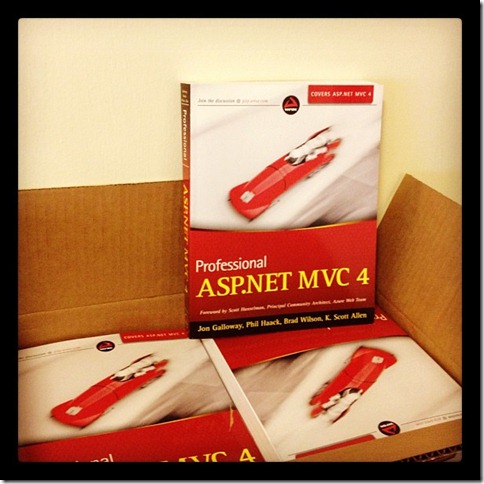The ASP.NET MVC 4 Book Is Available!
When someone says they want to write a technical book, I take a hammer and slam it on the aspiring author’s thumb and ask “How do you like that?” If the answer is, “Very much! May I have another.” This person is ready to write a technical book.
Sure, writing a book always starts off full of exciting possibilities. But it soon devolves into drudgery and pain with the constant question of whether the time spent is worth it when weighed against all your other obligations and opportunities in life.
But no matter how much I sometimes hate the process of writing a book, I do love this moment. The moment the fruits of your labor are delivered in a cardboard box and you open it up to see your name on a glossy cover with a speedy looking bobsled!
But soon after the big question sets in, “what the hell am I going to do with all these books?!” (I’ll bring some toMonkeySpacein October! And maybe I’ll give a few away via the internet if I can think of a criteria for giving them out.)
At long last, the Wrox Professional ASP.NET MVC 4 book written by me and my esteemed coauthors, Jon Galloway, K. Scott Allen, and Brad Wilson, is available (in Kindle and Print formats) on Amazon.
As Jon points out in his blog post, the Kindle version looks nice and is in color (on devices that support color of course).
Real World Development
This book includes a new chapter that I really did enjoy writing. The focus on the chapter is building a real world ASP.NET MVC application using the NuGet Gallery as a case study. The NuGet Gallery is the code behind http://nuget.org/, the online public host for thousands of NuGet packages with millions of package installs.
This is a great case study because it’s easy to visit the site while you read the chapter and you can easily grab the source code. The chapter covers the packages used to build the gallery as well as some of the trade-offs the NuGet gallery team made. For example, there are some places where we rolled our own features rather than using the built in defaults.
Ironically, because we haven’t upgraded the NuGet Gallery yet, the content of the chapter describes an ASP.NET MVC 3 project. But all of the concepts and packages apply equally well to an ASP.NET MVC 4 project.
If you’re building real web applications with ASP.NET MVC, I think you’ll find at least one thing useful in this chapter. Hopefully more!
Credits
I really must give a lot of credit to my coauthors who really knocked it out of the park. These are some smart folks I have the pleasure of working with. Extra kudos to Jon Galloway who was more or less the project manager and chief cheerleader in organizing the rest of us to get this book out the door.
I also want to give a big thanks to Eilon Lipton, our technical reviewer. He’s the developer lead still responsible for the developer team that works on ASP.NET MVC and Web API and is a meticulous reviewer.
What’s Next?
ASP.NET MVC 4 is the last version of ASP.NET MVC that I had any involvement with. I don’t plan to be a coauthor on the ASP.NET MVC 5/Web API 2 book at this point. I’m just not likely to be involved enough to have the level of insight that I’ve had in the past. Also, it’s really hard work.
So you should buy this book because it’ll be a collector’s item! Or, you can take the advice of another former coauthor of mine who said Don’t Buy This Book right after we finished one together. Either way, I won’t hold it against you. (But do buy it anyways just to spite Atwood.)
Will I write another book again? Maybe, but if I do it won’t be like any of the books I’ve worked on in the past. I have some ideas to write a fiction piece about a shimmery vampire wizard who goes to a school named PigPimples under the control of a spoiled brat king named Jeffrey who hates his midget uncle Teeryon Bannister. I even have a catchy phrase, a Bannister always pays his dates.
If it somehow turns out that writing fiction doesn’t work out, I might be interested in writing a book that explores more of the people aspects of software development or related to core principles. Something that doesn’t change and get outdated every year.
Or perhaps I’ll just keep randomly slamming keys on my keyboard and publish the result on my blog and call it a blog post. At least I still have fun doing that.

Comments
25 responses